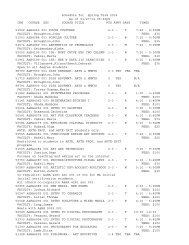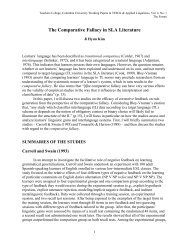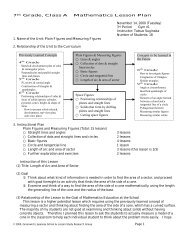UNICEF Mongolia - Teachers College Columbia University
UNICEF Mongolia - Teachers College Columbia University
UNICEF Mongolia - Teachers College Columbia University
Create successful ePaper yourself
Turn your PDF publications into a flip-book with our unique Google optimized e-Paper software.
CHAPTER 4: THE IMPLEMENTATION OF THE 2007 SALARY REFORM AT SCHOOL LEVEL<br />
signals to teachers that the formave evaluaon of students is part and parcel of the teaching profession<br />
and, for this reason, does not need to be compensated addionally. For educaon managers, the<br />
eliminaon of the notebook-checking supplement entails less control and less micro-management<br />
of teachers. Their previous role involved meculously counng the number of notebooks checked by<br />
teachers and measuring it in terms of the frequency of red ink used on student notebooks. If necessary,<br />
the managers would determine deducons from the supplement and think of addional punive<br />
measures. Clearly, any reform that targets the change in professional identy needs to be considered<br />
fundamental, even if it is minor in financial terms, as was the case in the funconal supplement for<br />
notebook checking. Understandably, the professionals—teachers and managers—at first resisted such a<br />
fundamental change.<br />
It is important to point out that the funconal supplement for class teachers has been preserved. Primary<br />
school teachers earn slightly more than secondary school teachers because they are class teachers by<br />
default. However, their chances of making addional income from extra teaching hours are also smaller.<br />
The other two funconal supplements are less controversial. The supplement for head of secon is a<br />
proxy for the rank of the teacher who is heading the secon. <strong>Teachers</strong> who tend to serve as heads of the<br />
secon are typically teachers with professional qualificaons—that is, lead teachers, methodologists, or<br />
advisors who already earn a rank supplement. Thus, despite the fundamental reform of 2007, experienced<br />
teachers tend to be rewarded three mes more than young and inexperienced teachers. Older teachers<br />
earn more because:<br />
• their base salary is higher because their salary category, based exclusively on years of teaching,<br />
is higher (total: 5 categories)<br />
• they are more likely to receive a rank supplement for having been promoted to lead teacher,<br />
methodologist, and in a few cases to advisors; and<br />
• the chances of being entrusted with supervising a cabinet (resource center, class room,<br />
laboratory, etc.) or heading a secon are higher than for younger teachers.<br />
In fact, a fourth phenomenon needs to be menoned in this context. Even though there are far fewer<br />
addional hours assigned to teachers than before the 2007 salary reform, the ones that have the best<br />
chances of geng assigned addional hours are older or experienced teachers. In the interviews with<br />
educaon managers, the managers pointed out two selecon criteria for assigning teachers to addional<br />
hours: (a) subject match and (b) teaching experience. In the current salary system in which the nominal<br />
value of the base salary and the supplements were substanally raised, there seems to be lile jusficaon<br />
for having these kinds of retenon payments, which are more typical of systems that fear losing effecve<br />
and experienced teachers to other professions or the private sector.<br />
4.2.2. Deduction of Salary Supplements<br />
One of the most intriguing findings of the PETS <strong>Mongolia</strong> Study that we managed to problemaze was the<br />
deducon of salary supplements. There used to be a very elaborate, me-consuming and, for teachers,<br />
humiliang control apparatus in place to review teachers’ work. The various salary supplements, each<br />
one of them only amounng to a small fracon of the total pay, served as an entry point for managers<br />
to sancon teachers. The PET study solicited informaon on deducons administered by principals,<br />
1<br />
2<br />
3<br />
4<br />
5<br />
6<br />
TEACHERS IN MONGOLIA: AN EMPIRICAL STUDY ON RECRUITMENT INTO TEACHING,<br />
PROFESSIONAL DEVELOPMENT, AND RETENTION OF TEACHERS<br />
65



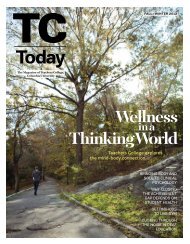
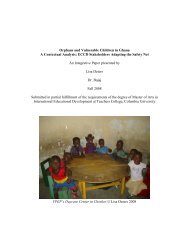
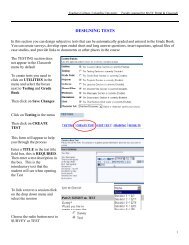
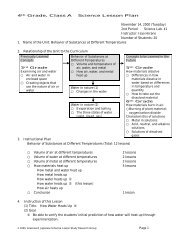
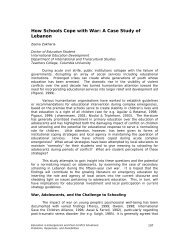

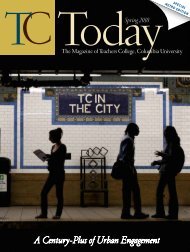
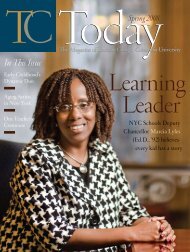


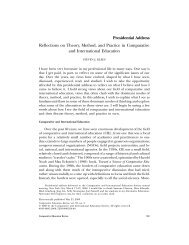
![TC Tod[...].pdf - Teachers College Columbia University](https://img.yumpu.com/27074883/1/190x252/tc-todpdf-teachers-college-columbia-university.jpg?quality=85)
